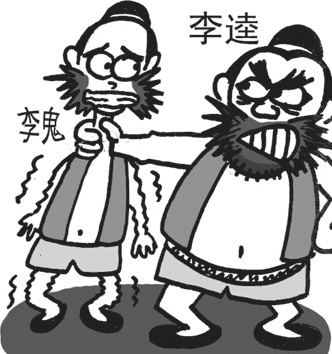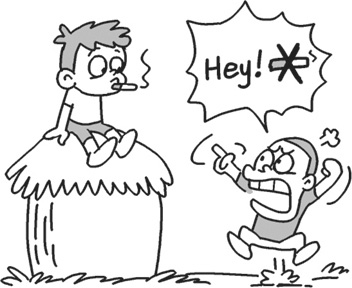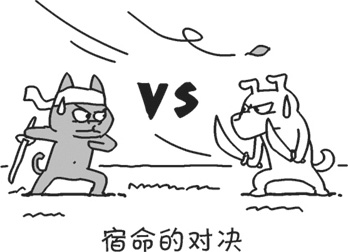





adj. 内部的(inner);内地的 n. 内部;[the ~]内陆(inland)
【记】词根记忆:inter(内)+ior(属于…的)→内部的
【搭】interior design 室内设计;in the interior of 在…内部
【例】If a volcano erupts, some of the Earth's interior heat escapes to the surface. 如果火山喷发,地球内部的一些热量就会转移到地表。
n. 宪法,章程;身体素质;构成
【记】词根记忆:con(共同)+stitut(建立)+ion(表物)→共同建立的章程→宪法
【例】The student studied the genetic constitution of cells hard. 这个学生努力学习细胞的基因构成。
【派】constitutional (adj. 章程的,宪法的);constitutionally (adv. 按照宪法)
v. (使)结冰,(使)凝固
【搭】freeze over 冰封;freeze up (机器、引擎等中的水)结冰
【例】Jack caught a fish and dropped it beside him on the ice and it froze solid.
杰克捉到一条鱼,将其随手扔在身旁的冰上,结果鱼冻得硬邦邦的。
v. (使)脱水(dry, desiccate)
【记】词根记忆:de(去掉)+hydr(水)+ate(使…)→使去掉水→(使)脱水
【例】The little girl's body had dehydrated dangerously with the high temperature. 那个小姑娘的体温很高,严重脱水。
【派】dehydration (n. 脱水;干燥)
adj. 蜿蜒的(winding);迂回的
【记】词根记忆:sinu(弯曲)+ous(…的)→弯曲的→蜿蜒的
【例】They walked along the sinuous course of the river. 他们沿着弯弯曲曲的河道散步。

alarm
n. 闹钟;警报(alert) vt. 使惊恐(startle);使担心
【记】联想记忆:al+arm(武器)→用武器来惊吓→使惊恐
【搭】burglar alarm 防盗警报;alarm call 叫醒电话
【例】Ecologists would probably be alarmed by the scientists' findings. 科学家们的发现可能会让生态学家们感到惊恐。
【派】alarming (adj. 令人惊慌的);alarmist (n. 危言耸听者)
n. 〈总称〉机器,机械(machines in general);机构(organization)
【记】来自machine (n. 机器,机械)
【例】The use of farm machinery continued to increase. 农机工具的使用在继续增加。
vt. 预期,期望,指望(anticipate)
【例】Economists expect the global economy to drop by 2% this year. 经济学家预计今年全球经济将下降2%。
【派】expectancy (n. 预期;期待)
【参】inspect (vt. 检查);aspect (n. 方面)
vt. 预见,预期(*look forward to, foresee, expect);先于…行动
【记】词根记忆:anti(=ante 前面)+cip(拿,握住)+ate→提前把握(事物发展结果)→预见
【例】The test was much harder than he had anticipated . 测验比他预期的要难得多。
【派】anticipation (n. 预期,预料)
n. 评论家,批评家;吹毛求疵者(detractor)
【记】词根记忆:crit(判断)+ic(表名词,人)→判断(是非)的人→评论家,批评家
【搭】music critic 乐评人
【例】The coal industry has been targeted by critics as a significant contributor to the greenhouse effect. 煤炭业被评论家指责为造成温室效应的罪魁祸首。
【派】critical (adj. 批判性的);criticism (n. 评判;批评);criticize (v. 批评;评论)
adj. 本能的
【例】We must completely understand and be aware of its instinctual behavior. 我们必须充分理解并意识到它的本能行为。
adj. 神秘的(weird);异乎寻常的(unusual)
【记】联想记忆:un(不)+can(能)+ny→不能理解的→异乎寻常的
【例】The magician says it doesn't end here, and the uncanny part is yet to come. 魔术师说,魔术到此并未结束,神秘的部分还在后头。

arrest
n./vt. 逮捕,拘留;阻止;吸引
【搭】arrest warrant 逮捕证,逮捕令
【例】The suspect was put under arrest by the police. 犯罪嫌疑人被警察逮捕了。
v. 撒,洒,喷 n. 少量
【记】联想记忆:sprin(看作spring,春天)+kle→春天的阳光洒在身上很舒服→洒
【例】 Sprinkle some pepper on the dish when it's done. 菜出锅后,在上面撒点胡椒粉。
adj. 传统的;正统的
【记】词根记忆:ortho(正)+dox(观点)→正统观点的→正统的
adj. 文字出现以前的,没有文字的
【记】词根记忆:pre(前)+liter(文字)+ate(…的)→文字出现以前的
【例】In preliterate societies oral literature was widely shared; it saturated the society and was as much a part of living as food, clothing, shelter, or religion. 在文字出现以前,口头文学被广泛传播。口头文学遍布社会,与食物、衣服、住处或宗教一样,是生活的重要组成部分。
adj. 名义上的;(费用等)微不足道的
【记】词根记忆:nomin(名称)+al(…的)→名义上的
【搭】nominal assets 名义资产
【例】Frank is only a nominal chairman; the real work is done by others. 弗兰克只是名义上的主席,实际工作是其他人做的。
n. 确定,确信;必然性(certainty)
【记】词根记忆:cert(搞清)+itude(表名词,状况)→搞清楚→确定
【搭】moral certitudes 道德信念
【例】The old man told me with absolute certitude there was a shoeshop on the corner. 那个老人十分确定地告诉我街角就有一家鞋店。
n. 忙碌 vt. 猛推;催促
【搭】hustle and bustle 熙熙攘攘
【例】I hate the hustle and bustle of the city life. 我讨厌熙熙攘攘的城市生活。

fake
adj. 冒充的 n. 假货;骗子 v. 伪造;伪装
【记】联想记忆:打击造(make)假(fake)
【例】All the paintings proved to be fakes . 所有的画最后被证实都是赝品。
vt. (在…上)雕刻;铭刻
【记】联想记忆:en(进入)+grave(坟墓)→进入坟墓也要记着,真是刻骨铭心→铭刻
【例】The teacher told us to engrave these rules on our mind. 老师告诉我们要把这些规则熟记于心。
【派】engraving (n. 雕刻术,刻版术;版画)
v. 禁止,阻止(prevent)
【记】词根记忆:pro(向前)+hibit(拿住)→提前拿住→禁止
【例】The government introduced a new law to prohibit smoking in public. 政府推出一项新法律以禁止在公众场所吸烟。
n. 尊敬,敬意
【记】词根记忆:hom(人)+age(表集体名词)→敬意
【例】Many people came to pay homage to those soldiers who died in the war. 很多人前来向在战争中牺牲的士兵致敬。
vt. 改编成戏剧;使戏剧化,戏剧性地表现
【记】来自drama (n. 戏剧)
【例】He intended his novel to dramatize the relationship between sense and sensibility. 他想在小说里戏剧化地描写理智与情感的关系。
vt. 使迷恋;使糊涂(confuse)
【记】词根记忆:in(使…)+fatu(笨)+ate(表动词)→使愚笨→使糊涂
【例】The part that makes people infatuate Barbie the most is her countless beautiful clothes. 芭比最令人们痴迷的是她有着数不清的漂亮衣服。
adj. 独占的;排他的;豪华的 n. 独家新闻
【记】词根记忆:ex(出)+clus(关闭)+ive(…的)→把其余的都关在门外→独占的
【搭】exclusive of 除…外,不计算在内
【例】The two options are not mutually exclusive . 这两个选择并不互相排斥。

cynical
adj. 愤世嫉俗的
【记】来自cynic (n. 愤世嫉俗者)
【例】With a cynical view, the young man is easily to go to extremes. 这个年轻人持有愤世嫉俗的观点,很容易走极端。
v. 区别;歧视(differentiate)
【记】词根记忆:dis(表加强)+crimin(区别)+ate→区分(对待)→区别;歧视
【搭】discriminate between 区别;discriminate against 歧视
【例】You must learn to discriminate right from wrong. 你必须学会明辨是非。
v. 结交(*consort);关联(relate)
adj. 副的;合伙的 n. 伙伴(companion, partner)
【记】词根记忆:as(表加强)+soci(同伴)+ate(做)→成为同伴→结交
【例】I always associate the smell of baking with my childhood. 一闻到烘烤食物的味道,我就会想起自己的童年。
【派】associated (adj. 关联的;联合的);association (n. 协会;联合);associative (adj. 联想的;结合的;关联的)
vt. 抽出(时间等);免除 adj. 备用的;空闲的(free) n. 备用品(reserve)
【例】I don't know if I could spare the time. 我不知道能否抽出空来。
n. 数据库
【记】组合词:data(数据)+base(基地)→数据库
【例】You can't use the figures from the database , because it is flawed. 这个数据库有缺陷,你不能用里面的数据。
vt. 宣布,声明(declare, announce);显示(display)
【记】联想记忆:pro(在前)+claim(叫,喊)→在前面大声讲话→宣布
【例】Advocates of organic foods frequently proclaim that such products are safer and more nutritious than others. 有机食品的支持者经常宣称这些产品比其他食品更加安全、更有营养。
【参】exclaim (v. 惊呼);reclaim (vt. 要求归还)
n. 水平;高度(altitude);级别 adj. 平坦的(plain);等高的 vt. 夷平,使平坦
【搭】level off/out (经过急剧的涨落后)保持平稳发展
【例】The mountains were leveled and their debris dumped into the oceans. 山脉被夷平,岩屑注入了海洋。

controversy
n. 争议,争论,辩论(dispute, argument)
【记】词根记忆:contro(相反)+vers(转)+y→因反对转向另一方→争论,辩论
【搭】arouse/cause controversy 引起争论
【例】There was a bitter controversy over his latest novel.
关于他最新的小说,存在着激烈的争论。
【派】controversial (adj. 有争议的;好争论的)
vt. 反对,对抗(object, resist)
【记】词根记忆:op(逆)+pos(放)+e→放在(某物)的对立面→反对,对抗
【例】Politicians rarely opposed the government's generous support of business owners. 政客们很少反对政府对企业家的慷慨支持。
【派】opposed (adj. 反对的);opposing (adj. 反向的;相反的)
adj. 有毒的(poisonous);中毒的
【记】词根记忆:tox(毒)+ic(…的)→有毒的
【例】Some plant tissues contain a diverse array of toxic or potentially toxic substances. 某些植物组织含有各种有毒或可能有毒的物质。
【派】toxicity (n. 毒性)
v. 领导,引导;领先;通向;导致,引起 n. 带领,引导
【搭】lead to 导致;通向;lead the way 带路,引路
【例】A: I can't believe that Prof. Lawrence is going to retire.
B: He's still going to lead a seminar each semester though.
A: 我不敢相信劳伦斯教授就要退休了。
B: 不过他还是会每个学期组织一次研讨会。
【参】head (n. 头)
adj. 不锈的
【记】组合词:rust(铁锈;生锈)+proof(防…的)→防止生锈的→不锈的
【例】Stainless products are so popular because they are rustproof . 不锈钢产品不会生锈,所以大受欢迎。
adj. 阳光照射的
【记】联想记忆:sun(太阳)+lit(light的过去分词,照亮)→阳光照射的
【例】Icebergs are graceful, stately, inspiring in calm, sunlit seas. 在阳光照射的平静海洋上,冰山优雅壮观,令人鼓舞。
n. 职业(occupation);同行;专业(specialty);宣称
【搭】enter/go into a profession 从事/加入一个行业
【例】She was a teacher by profession . 她的职业是教师。

hay
n. 干草(stover)
【搭】hay stack 干草堆
n. 素食者 adj. 素食者的
【记】来自vegetable (n. 蔬菜)
【搭】vegetarian principles 素食主义;vegetarian restaurant 素食饭馆
【例】Obtaining enough protein in the diet is especially important for vegetarians . 对素食者而言,从膳食中获得足够的蛋白质尤其重要。
n. 专栏(文章);柱,支柱(pillar);纵队
【例】The temple is supported by marble columns . 这座庙宇由大理石柱支撑着。
n. 微生物;细菌(bacteria, germ)
【记】词根记忆:micro(微小的)+be(=bio 生命)→微生物
【例】 Microbes are one of the oldest forms of life on Earth. 细菌是地球上最古老的生命形式之一。
【派】microbial (adj. 由细菌引起的);microbiology (n. 微生物学)
n. 家宅,农庄;宅地
【记】词根记忆:home(家)+stead(站,立)→一家挨一家的站立→家宅
【例】The original Homestead Act was signed into law by President Abraham Lincoln in 1862. 《宅地法》最早于1862年由亚伯拉罕·林肯总统签署成为法律。
【派】homesteader (n. 农场所有人;自耕农)
n. 峡谷
【例】The Grand Canyon was considered a barrier to travelers. 人们认为大峡谷是旅行者的一个障碍。
【参】crayon (n. 蜡笔)
n. 画像技法;肖像,画像
【例】Many innovations in the various forms of portraiture evolved during this fertile period. 在这个多产的时期,各种画像技法都得到了大量创新。
【参】landscape (n. 风景画)
n. 合金
vt. 把…铸成合金
【记】联想记忆:all(所有的)+oy→把所有金属混在一起→合金
【例】Brass is an alloy of copper and zinc. 黄铜是铜锌合金。
adj. 用显微镜可见的;极小的,微小的
【记】词根记忆:micro(微小的)+scop(看)+ic(…的)→小得看不清的→极小的
【搭】microscopic creature 微生物;microscopic analysis 显微镜分析
【例】Compared with a mountain, the rock is microscopic . 与大山相比,石头显得极其微小。
n. 诗歌(poetry);韵文(rhyme);诗节
【记】词根记忆:vers(转)+e→诗歌的音节百转千回→诗歌
【例】Walt Whitman originated a distinctive form of free verse . 沃尔特·惠特曼创造了一种独特的自由诗体。
n. 证书(certificate);文凭(diploma);资格(qualification)
【记】词根记忆:cred(相信)+ent+ial→让人相信的东西→证书
【例】None of the people who applied for the job has the required credentials . 申请这份工作的人都不具备所需的证书。
adj. 高耸的(topping);杰出的
【记】联想记忆:tower(塔)+ing→像塔一样的→高耸的
【例】 Towering skyscrapers cast long shadows at dusk. 耸入云霄的摩天大楼在黄昏时分投射出长长的影子。
adj. 普遍深入的;遍及的,弥漫的
【记】来自pervade (vt. 弥漫,遍及)
【例】The basic fact has been the most pervasive influence in determining the social arrangements and cultural practices of the people. 这一基本事实已最普遍深入地影响着人们的社交安排和文化习俗。
adj. 茂盛的(flourishing)
【例】Severin began to paint large, lush still lifes of flowers, fruit, or both. 塞弗兰开始创作花卉、水果或两者兼而有之的大幅葱翠静物写生。
【派】lushness (n. 草木茂盛)
【参】blush (v./n. 脸红);slush (n. 烂泥)
adj. (岩石)火成的
【记】词根记忆:ign(点火)+eous(有…性质的)→火成的
【例】Intrusive igneous rocks are formed from magma that cools and solidifies within the crust of a planet. 侵入火成岩由在行星表面冷却并凝固的岩浆形成。
adj. 显著的,突出的(distinct, outstanding)
【记】词根记忆:sali(=sal 跳)+ent(…的)→跳出来的→突出的
【例】He pointed out the salient features of the new design. 他指出了新设计的几个显著特征。

rescue
vt./n. 营救,搭救(save)
【记】联想记忆:res(看作rest,休息)+cue(线索)→放弃休息紧追线索,进行营救→营救
【例】We only try to rescue the most valuable first-edition books in our collection. 我们只尽力抢救收藏中最珍贵的首版书。
vt. 获得,取得(*obtain, gain)
【记】词根记忆:ac(表加强)+quir(寻求,获得)+e→不断寻求才能获得→获得
【例】They have just acquired a starting capital of $900,000. 他们刚刚获得90万美元的启动资金。
【派】acquired (adj. 后天习得的,已获得的);acquisition (n. 获得,习得;购置)
【参】require (vt. 需要);inquire (v. 询问)
n. 几何;几何学
【记】词根记忆:geo(地)+metr(测量)+y(表名词)→土地面积测量法→几何学
【例】I had the wrong date for my geometry test. 我记错几何测试的日期了。
【派】geometric (adj. 几何的;几何图案的);geometrically (adv. 几何学上地);geometrician (n. 几何学者)
adj. 内部的;内心的 n. 内部;内心
【记】词根记忆:in(在…里面)+ner→内部的;内心的
【例】The drama reflected the inner frustrations of the dramatist. 这部戏剧反映了剧作家内心的挫败感。
【派】innermost (adj. 最里面的)
v. (使)联合,(使)结合(*fuse, unite)
【记】词根记忆:com(共同)+bi(两个)+ne→使两个在一起→(使)结合
【例】In public ceremonies singing is combined with dancing and with music from a variety of instruments. 在公共仪式上,歌唱与舞蹈以及各种乐器演奏的音乐结合在一起。
v. (使)枯萎
【记】联想记忆:sh(音似:使)+rivel(看作river,河流)→天气干旱使河流无水,树木枯萎→(使)枯萎
【例】The hot weather had shriveled the leaves on the plants. 天气炎热,植物的叶子都蔫了。
【派】shriveled (adj. 枯萎的)
n. 幼年(babyhood);(发展或生长的)初期(beginning)
【记】来自infant (n. 婴儿,幼儿)
【搭】in one's infancy 处于初创期
【例】In the Earth's infancy , its surface was warm enough for life. 地球形成初期,其表面很温暖,能维持生命。
n. 糖浆
【记】联想记忆:sy+rup(看作cup,杯)→一杯一杯地喝糖浆→糖浆
【例】The syrup may also be sugar-free. 糖浆也可以是无糖的。
n. 大麻(纤维);由大麻制成的麻醉药
【例】It is illegal to grow hemp in the United States, although some related medicines are legally imported. 在美国种植大麻是非法的,尽管与其相关的药物可以合法进口。
adj. 道德的(moral)
【例】In his positive ethical viewpoint, George tries to support the opinion that human beings should live in harmony with nature. 乔治具有积极的道德观,他尽力支持人类应该与自然和谐共处的观点。
【参】ethnic (adj. 人种的,种族的)

mammoth
adj. 巨大的(enormous, huge) n. 猛犸,毛象
【例】The mammoth statue known as the Statue of Liberty is located in New York. 那座广为人知的巨大雕像——自由女神像,就位于纽约。
n. 杂草;水草
【记】联想记忆:种子(seed)在杂草(weed)中顽强生长
【例】The yard was overgrown with weeds . 庭院里杂草丛生。
n. 趋势,倾向(*tendency)
【记】联想记忆:倾向(tend)加r还是倾向(trend)
【搭】economic trend 经济趋势
【例】Other trends and inventions had also helped make it possible for Americans to vary their daily diets. 其他趋势和发明也使得美国人改变日常膳食成为可能。
vt. 激励(*stimulate, impel);激发(inspire)
【记】词根记忆:mot(动)+iv+ate(使…)→使动起来→激励;激发
【例】The students need to be motivated . 学生需要激励。
【派】motivated (adj. 有动机的;由…推动的);motivation (n. 动机;刺激)
v. (使)膨胀,扩大(expand);详述
【记】词根记忆:di(分开)+lat(拿出;放)+e→分开放(使变得更大)→(使)膨胀
【搭】dilate on/upon 详述
【例】The doctor told me red wine could help to dilate my blood vessels. 医生告诉我说,红葡萄酒有助于扩张血管。
【参】dilute (vt. 冲淡,稀释)
adj. (水平、价值)最高的;高峰的 n. 顶峰(*maximum, summit)
【记】发音记忆:“匹克”→奥林匹克的精神之一就是挑战极限,到达顶峰→顶峰
【例】After the peak year of 1957, the birth rate in Canada began to decline. 加拿大的出生率在1957年达到顶峰,之后开始下降。
adj. (鸟或动物)有返回原地本能的
【搭】homing pigeon 信鸽
【例】Many birds have a remarkable homing instinct. 很多鸟类都具有返回原地的非凡本能。
n. [pl. flagella] 鞭毛
【记】词根记忆:flagell(鞭子)+um→鞭毛
【例】Many bacteria lack flagella and cannot move about by their own power. 很多细菌没有鞭毛,不能靠自身的力量移动。
adj. 错综复杂的(*complex)
【记】词根记忆:in(在…里面)+tric(妨碍)+ate→里面有障碍的→错综复杂的
【例】A city is more intricate than a village. 城市比村庄更加错综复杂。
n. 比赛(game, match);锦标赛(title match)
【记】联想记忆:这样巡回(tour)参加比赛(tournament)真是个折磨(torment)
【例】I almost forgot to tell you about the all-day volleyball tournament going on.
我差点忘了告诉你现在全天都在举行排球锦标赛。
vt. 提倡(recommend publicly)
n. 倡导者(*proponent)
【记】词根记忆:ad(表加强)+voc(声音)+ate(表名词,人)→四处呼吁的人→倡导者
【例】They advocate the use of masonry in the construction of skyscrapers. 他们提倡在建造摩天大楼时使用石工技术。
【派】advocacy (n. 拥护,支持)
vt. 碾碎(grind);使变形;镇压
【记】联想记忆:碰撞(crash)后被碾碎(crush)
【例】The weight of a tornado can crush a building's roof when it passes overhead. 龙卷风经过时能将建筑物的屋顶摧毁。
【参】crash (v./n. 碰撞)
n. 成分,要素(element);(烹调的)原料
【记】词根记忆:in(进入)+gredi(=gradi 走)+ent(表名词)→走进内部的东西→成分
【例】Speed is the essential ingredient of all athletics. 速度是所有体育运动的基本要素。
n. 终点站(destination);终点;航站楼 adj. 末端的(endmost)
【记】词根记忆:termin(边界)+al(…的)→末端的
【搭】passenger terminal 客运枢纽站
【例】You'd be better off calling the terminal for a new schedule. 你最好给终点站打电话索取新的时刻表。
【参】terminus (n. 终点站);terminate (v. 终止,结束)
n./v. 擦,摩擦
【记】rubber (n. 橡皮)就是来自这个词
【例】If you rub some soap on that drawer, it might stop sticking. 如果你在抽屉上擦点肥皂,抽屉可能就不会再卡住了。
adj. 强有力的(powerful);巨大的
【例】This circumstance was mitigated by the mighty river and lake systems. 强有力的河流和湖泊系统减轻了这种状况。

accident
n. 意外事件,(交通)事故;偶然
【记】词根记忆:ac(表加强)+cid(落下)+ent(表名词)→落到身上→意外事件
【例】According to the new statistics, one in seven accidents is caused by drunken drivers. 最新统计数据表明,七起事故中就有一起是由醉酒驾驶造成的。
【派】accidental (adj. 意外的,偶然的);accidentally (adv. 意外地,偶然地)
n. 炎症,发炎
【记】词根记忆:in(使…)+flamm(=flam 燃烧)+ation(表名词)→燃烧→发炎
【例】The connection between inflammation and heart disease, arthritis, and other chronic ailments has become increasingly clear. 炎症与心脏病、关节炎及其他慢性病之间的关系已变得越来越清晰。
n. 防护物(defense);盾 vt. 保护(*protect, defend)
【例】The mountains surrounding Los Angeles effectively shield the city from the heat. 周边的山脉有效地使洛杉矶这个城市免受酷热之苦。
n. 噩梦;无法摆脱的恐惧;可怕的事
n. 协议,条约 v. 与…一致,符合(agree)
【记】词根记忆:ac(表加强) +cord(心)→双方达成一条心→协议,条约
【搭】in accord with 与…一致,符合;of one's own accord 自动地
【例】This action would not be in accord with our policy. 这一行动不会符合我们的方针。
【参】concord (n. 和睦;一致)

versus
prep. (表示两队或双方对阵)对,对抗;与…相对,与…相比
【记】词根记忆:vers(转)+us→转向→与…相对(常缩写成vs)
【例】When the scientists looked at the shoot versus the root surface, they found that the shoot surface, with all of its leaves, had a total surface area of about five square meters. 科学家们对比叶片芽部和根部的表面时发现,将所有叶片面积计算在内,芽部的总表面积约为五平方米。
adj. 天真的(naive);清白的;无恶意的(harmless)
【记】词根记忆:in(无)+noc(伤害)+ent(…的)→无害的→天真的
【例】The man was found innocent of any crime. 该男子获判无罪。
【派】innocence (n. 天真,无知;清白)